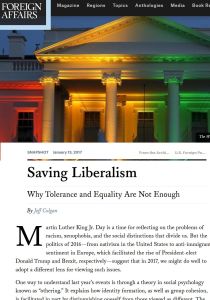Join getAbstract to access the summary!

Join getAbstract to access the summary!
Jeff Colgan
Saving Liberalism
Why Tolerance and Equality Are Not Enough
Foreign Affairs, 2018
What's inside?
Politicians must take people’s need to distinguish themselves from others seriously.
Recommendation
Many political observers point to America’s long, dark history of racism and bigotry to explain the rise of US president Donald Trump. However, social psychology’s theory of “othering” offers an alternative way of understanding Trump’s appeal – one that focuses on humans’ innate need to differentiate themselves from others. In this fascinating article for Foreign Affairs, political scientist Jeff Colgan stresses the need for leaders to accept these tendencies and find ways to channel them more constructively.
Summary
About the Author
Jeff D. Colgan is the Richard Holbrooke Associate Professor in the Department of Political Science and Watson Institute for International Studies at Brown University.
















Comment on this summary